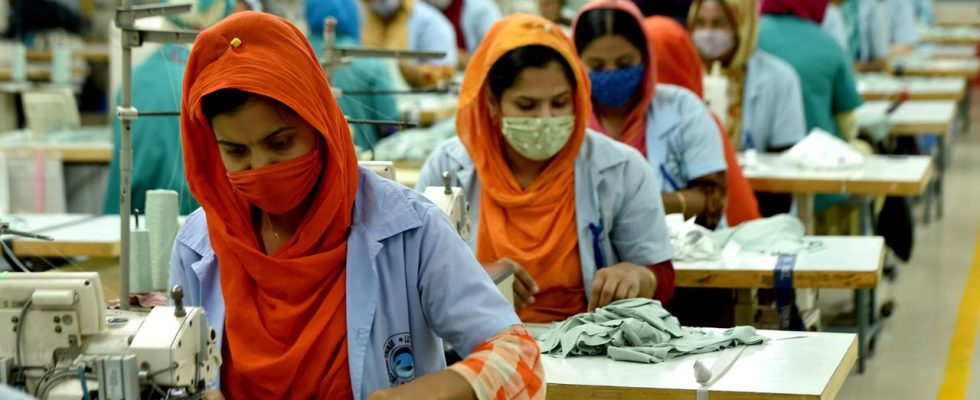background
The FDP is against the EU supply chain law – and claims to be acting in the interests of the German economy. It is definitely divided.
Christoph Werner, head of the drugstore chain dm, chooses clear words. “The path we are taking is a wrong path,” he told Capital magazine about the planned EU supply chain law. The plan is an “overreaching way of doing politics.”
But the request itself is correct. According to Werner, dm is “equipped” for this. dm itself has been considered a role model in the implementation of sustainability and respect for human rights for years.
If you ask around among the companies in Germany, it becomes clear: Opinions differ on the planned Corporate Sustainability Due Diligence Directive (CSDDD) – as the new EU supply chain law is officially called.
Some companies are calling for the implementation of the EU regulation. Because of the German regulations, they now see themselves at a competitive disadvantage compared to other countries.
Other companies internationally have already had such negative experiences with German legislation, which has been in force for over a year, that they fear even greater disadvantages from EU law and are relieved that it is not being implemented as planned.
Aldi Süd, Bayer, Mars per EUSupply Chain Act
At the beginning of the week, 18 companies and initiatives signaled their approval of the EU Supply Chain Act. The companies include the supermarket chain Aldi Süd, the chemical and pharmaceutical company Bayer, the food company Mars, the textile discounter KiK and the coffee chain Tchibo.
According to their own statements, they are already guided by UN or OECD standards for environmental protection and human rights and believe: “In our opinion, the CSDDD requirements are appropriate and implementable.”
The companies see an improvement in competition: “Especially for German companies that comply with the Supply Chain Due Diligence Act, a Europe-wide regulation means that competitive advantages at the expense of people and the environment are finally prevented,” the companies said. They want implementation.
In Germany, the so-called Supply Chain Due Diligence Act has been in effect since last year. Companies with 1,000 or more employees must observe environmental standards and human rights throughout their entire supply chain.
Study: German companies would benefit from EU rules
The result: A good two thirds of large companies already essentially meet the requirements of German legislation. This was the result of a study by the management consultancy wmp consult on behalf of the Hans Böckler Foundation, which is based on an evaluation of case studies, company reports and interviews.
According to the study, these companies would therefore “benefit from the fact that the same rules of the game apply throughout Europe”. Although the EU rules sometimes went beyond the German regulations, they also included relief for companies compared to German law.
According to DIHK Cascade effects and withdrawal
The German Chamber of Industry and Commerce, DIHK, partially contradicts this positive view. As a result of the Supply Chain Due Diligence Act, there is already a cascade effect in some cases: large companies would pass on the requirements addressed to them to their small and medium-sized suppliers.
This was the result of a DIHK survey of around 2,400 companies operating abroad in the summer. “Small and medium-sized companies often do not have the financial and human resources to meet these requirements,” said the DIHK.
The consequences are already noticeable: According to the DIHK, almost a quarter (23 percent) of the affected large companies with more than 3,000 employees stated that they were withdrawing from risk countries or were planning to do so. “This is a bad signal, especially against the background of the desired diversification of supply chains and trade relationships,” warned the DIHK.
“Respecting human rights and protecting the environment is a concern that unites politics and business. However, the consequences for Europe as a business location have not yet been sufficiently taken into account,” said DIHK deputy general manager Achim Dercks. However, sustainability should not be achieved at the expense of diversifying supply chains, which is essential, especially in difficult economic times.
“Consequences for Europe not sufficiently taken into account”
Now the DIHK has issued a warning tagesschau.de once again to exercise caution before haste: the current time pressure is not conducive to the acceptance of this fundamentally important topic in the economy, according to the DIHK. On the contrary: “This is particularly true for Germany, as the experiences with our national regulations are sometimes very negative, even among actors who are actually positive about the matter.”
Many companies fear things will get worse. If you ask around in various sectors, the players are generally open to EU regulations: the basic idea of harmonizing the internal market is not bad, they say. But there should be no burden beyond German law. The EU could learn from German law.
Above all, there are substantial concerns: the EU text is not yet good enough, companies and associations report and are calling for more legal certainty. Many of them primarily point out the possibility that legal action can be taken against them: Of course, violations would have to be punished, say the industry. But the legal terms must be clearly defined so that companies are not arbitrarily blackmailed or pilloried.
And so in many parts of the German economy there is a real sense of relief about Germany’s planned abstention from the EU law.
Alternative suggestions
There are alternatives to the previous draft law: dm boss Werner advocates trade agreements and seals that prove compliance with standards.
Franz Staberhofer, head of logistics at the Upper Austria University of Applied Sciences, had already proposed a list regulation in the fall: It must “relieve companies in a legally binding manner.”
Manufacturing companies would no longer have to go through the same procedure individually. “This would put the focus back on the goal of the Supply Chain Act: sustainability.”

